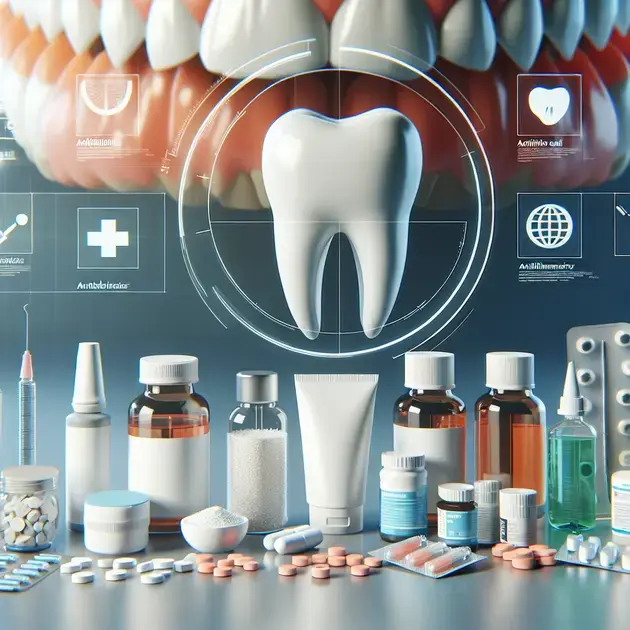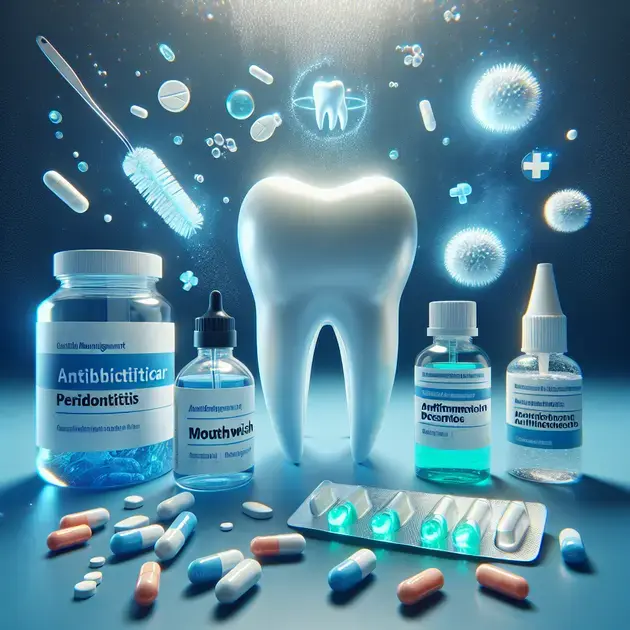When it comes to tackling periodontitis, having access to effective medication is crucial. This comprehensive guide aims to provide valuable insights into the various treatment options available for combating this common condition.
Periodontitis is a serious gum infection that damages the soft tissue and destroys the bone that supports your teeth. With advancements in dental medicine, there are now several medications that have been proven to be highly effective in managing and treating periodontitis.

Effective Medication for Periodontitis: Understanding the Importance
Periodontitis is a serious gum infection that damages the soft tissue and destroys the bone that supports your teeth. It can lead to tooth loss and other health problems if left untreated. Understanding the importance of effective medication for periodontitis is crucial in managing and treating this condition.
One of the most common medications prescribed for periodontitis is antibiotics. These medications help to control the bacterial infection in your gums and prevent it from spreading further. Examples of antibiotics commonly used for periodontitis include doxycycline and metronidazole.
Another important medication for periodontitis is antimicrobial mouthwash. This type of mouthwash helps to reduce the bacteria in your mouth, promoting healthier gums and preventing the progression of the infection. Chlorhexidine is a common ingredient found in antimicrobial mouthwashes used for periodontitis.
It is essential to understand the importance of following your dentist or periodontist’s recommendations when it comes to medication for periodontitis. Skipping doses or not completing the full course of antibiotics can lead to antibiotic resistance and ineffective treatment of the infection.
By understanding the importance of effective medication for periodontitis, you can take control of your oral health and work towards preventing further damage to your gums and teeth.
Exploring Different Types of Medication for Periodontitis
When exploring different types of medication for periodontitis, it is important to consult with your dentist or periodontist to determine the most suitable treatment plan for your specific condition. There are several options available, each with its own benefits and considerations.
One common type of medication for periodontitis is topical antibiotics. These antibiotics are applied directly to the infected gums and can help to target the bacteria causing the infection more effectively. Examples of topical antibiotics include minocycline hydrochloride gel.
In some cases, systemic antibiotics may be prescribed to treat periodontitis. These antibiotics are taken orally and circulate through the bloodstream to target the bacteria in your gums. Common systemic antibiotics used for periodontitis include amoxicillin and clindamycin.
For individuals with severe periodontitis, surgical intervention may be necessary in addition to medication. Procedures such as scaling and root planing or flap surgery may be performed to remove plaque and tartar buildup and reduce the depth of periodontal pockets.
Exploring different types of medication for periodontitis with the guidance of your dental professional can help you make informed decisions about your treatment plan and improve the overall health of your gums and teeth.
Key Factors to Consider When Choosing Medication for Periodontitis
When choosing medication for periodontitis, there are several key factors to consider to ensure the most effective treatment for your condition. Understanding these factors can help you work closely with your dental provider to develop a personalized treatment plan.
Evaluation of the Severity of Periodontitis
The severity of your periodontitis will influence the type and dosage of medication prescribed. Your dentist or periodontist will evaluate the extent of the infection and recommend the appropriate treatment based on this assessment.
Possible Drug Interactions
It is essential to inform your healthcare provider about any medications you are currently taking to prevent potential drug interactions. Certain antibiotics and other medications can interfere with each other, affecting the effectiveness of your treatment.
Patient’s Medical History
Your medical history, including any allergies or previous reactions to medications, will also play a role in determining the most suitable medication for periodontitis. Be sure to provide detailed information about your health background to your dental provider.
Adherence to Treatment Plan
Compliance with your prescribed medication regimen is crucial for successful treatment of periodontitis. Be sure to follow your dentist’s instructions carefully and complete the full course of antibiotics or other prescribed medications to maximize the effectiveness of the treatment.
Considering these key factors when choosing medication for periodontitis can help you and your dental provider create a comprehensive treatment approach tailored to your individual needs and health goals.

**Understanding the Role of Medication in Managing Gum Disease**
Introduction
Medication plays a crucial role in managing gum disease, also known as periodontal disease. With proper medication, patients can effectively control and treat the progression of this oral condition. Understanding how medication works in managing gum disease is essential for both patients and healthcare providers.
Types of Medication
There are several types of medication used in managing gum disease. Antibiotics, such as tetracycline and doxycycline, are commonly prescribed to fight bacterial infections in the gums. Antiseptic mouthwashes and gels can also be used to reduce plaque and bacteria in the mouth. Additionally, anti-inflammatory drugs may be recommended to reduce gum inflammation.
Benefits of Medication
Medication can provide numerous benefits in managing gum disease. Antibiotics help eliminate harmful bacteria, preventing further damage to the gums and teeth. Antiseptic products can reduce plaque buildup and improve overall oral hygiene. Anti-inflammatory drugs help reduce swelling and discomfort associated with gum disease.
Proper Use of Medication
It is crucial for patients to follow their dentist’s instructions when using medication for gum disease. Proper dosage and frequency of use are important to ensure the effectiveness of the treatment. Patients should also be aware of any potential side effects and report them to their healthcare provider.
Combination Therapy
In some cases, dentists may recommend a combination of medications to effectively manage gum disease. This approach may involve using antibiotics, antiseptic products, and anti-inflammatory drugs together to target different aspects of the condition. Combination therapy can lead to better outcomes for patients.
**
Conclusion
**
Understanding the role of medication in managing gum disease is paramount for both patients and healthcare providers to effectively combat this oral condition. By utilizing various types of medication such as antibiotics, antiseptic products, and anti-inflammatory drugs, individuals can target different aspects of gum disease for comprehensive treatment.
Medication offers a multitude of benefits in the management of gum disease. Antibiotics play a crucial role in eliminating harmful bacteria, preventing further damage to the gums and teeth. Antiseptic mouthwashes and gels aid in reducing plaque buildup, promoting improved oral hygiene. Additionally, anti-inflammatory drugs help alleviate swelling and discomfort associated with gum disease, enhancing overall patient comfort.
Proper use of medication is essential for successful treatment outcomes. Patients must adhere to their dentist’s instructions regarding dosage and frequency of medication to ensure its effectiveness. Being vigilant about potential side effects and promptly reporting them to healthcare providers is crucial for maintaining oral health and well-being.



